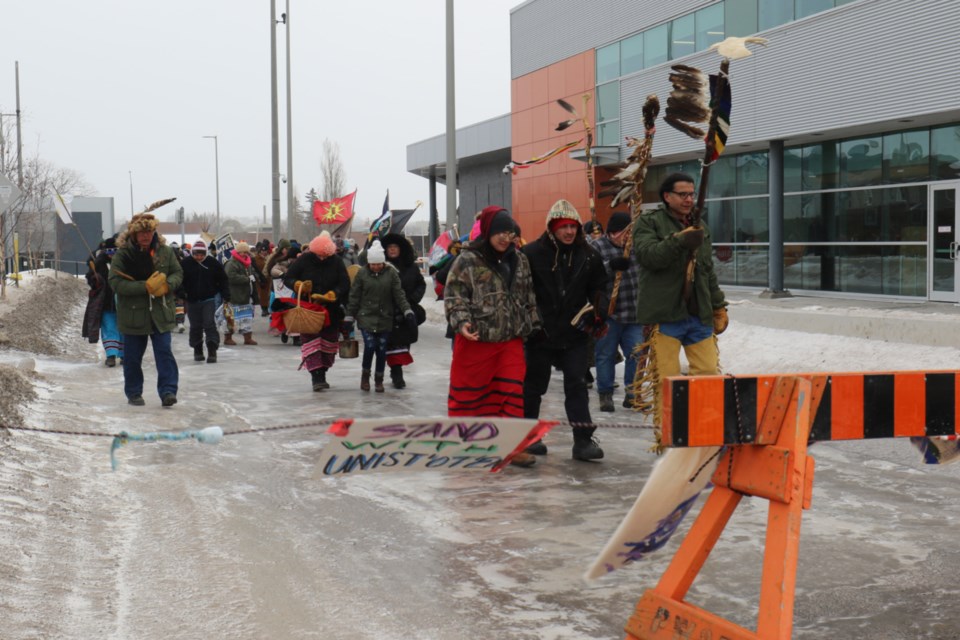Dozens of Wet’suwet’en supporters marched to the middle of the International Bridge Thursday for a water ceremony in cooperation with the bridge authority, border services and city police.
The ceremony - which closed the border crossing to traffic for nearly three hours - was held in support of Wet’suwet’en hereditary chiefs who are opposed to Coastal GasLink’s $6-billion liquified natural gas pipeline project on Wet’suwet’en unceded territory.
“Personally, I am here because I want to show support for what is happening in Wet’suwet’en territory, Tyendinaga territory and across all unceded nations,” said Conika Belleau, who was one of the many supporters waiting to walk the bridge Thursday. “CGL [Coastal GasLink] pipeline began construction long before they had an approval or a denial, and once they came to unceded territory, they were blocked - and that’s where they ended up meeting Wet’suwet’en people with force and trying to remove them.”
Nathan Wright travelled from Petoskey, Mich. along with a couple other supporters from nearby Hessel, Mich. in order to lend their support to the water ceremony.
He saw a number of Canadians protesting alongside him in Standing Rock, and now, he wants to return the gesture.
“We don’t believe that it’s right for a private company to put their pipelines through Indigenous territory, especially when they’re against it,” said Wright. “So many times cities have said, ‘hey, we don’t want a pipeline going through our city,’ and so they don’t do it. But for Indigenous people, for some reason, they think it’s OK.”
Candace Day Neveau, who has been speaking on behalf of the group of people who blocked off the Huron Street entrance to the border crossing, says Thursday’s water ceremony and bridge march was informed by spirit, ceremony and prayer, stressing that this week’s barricade is a peaceful response.
But it’s also a response meant to inconvenience border-crossers after more than 500 years of inconvenience and oppression for Indigenous peoples across Canada.
“I just look at what’s going on in Tyendinaga as well - OPP officers are still brutalizing land defenders, and I prioritize that. It’s still ongoing,” she told SooToday. “Here today, we prioritize ceremony first.”
Day Neveau travelled to British Columbia earlier this month in support of Wet’suwet’en hereditary chiefs and their supporters, where she witnessed the initial RCMP raids on Wet’suwet’en camps firsthand.
“It was crazy seeing the RCMP right over the treeline. We went and cleaned up after the first raid - we went and picked up all the land defenders’ things for them,” she said.
After abruptly calling off a meeting with Wet’suwet’en hereditary chiefs Wednesday, the federal and provincial levels of government agreed to sit down with chiefs Thursday.
It’s expected the meetings will run into Friday.
Wet’suwet’en hereditary chiefs say the British Columbia government and the federal government called off Wednesday night’s meeting because the hereditary chiefs refused to order First Nations and their supporters to remove rail blockades across the country.
"In our law, we can't do that," Chief Na'Moks, who also goes by John Ridsdale, told The Canadian Press Wednesday. "We can't tell another sovereign nation what to do and we would not expect them to do that to us."
It’s just one of the outstanding issues that many walking the bridge Thursday feel need to be resolved in order to make forward progress.
“I just feel like that’s wrong, and so do many people across the nation. Our Indigenous people have suffered a chain of injustices for too many years,” Belleau said. “This territory they’re trying to build this pipeline on is not property of Canada. It was never signed over.”
“It would be the same as somebody trying to build infrastructure through your backyard without your consent, trying to poison your family’s play area, your garden that you can eat from, your water source. We just don’t believe it’s right. We’re here not only to protect Indigenous rights, but human rights, because water is essential to all life.”
- with files from The Canadian Press
